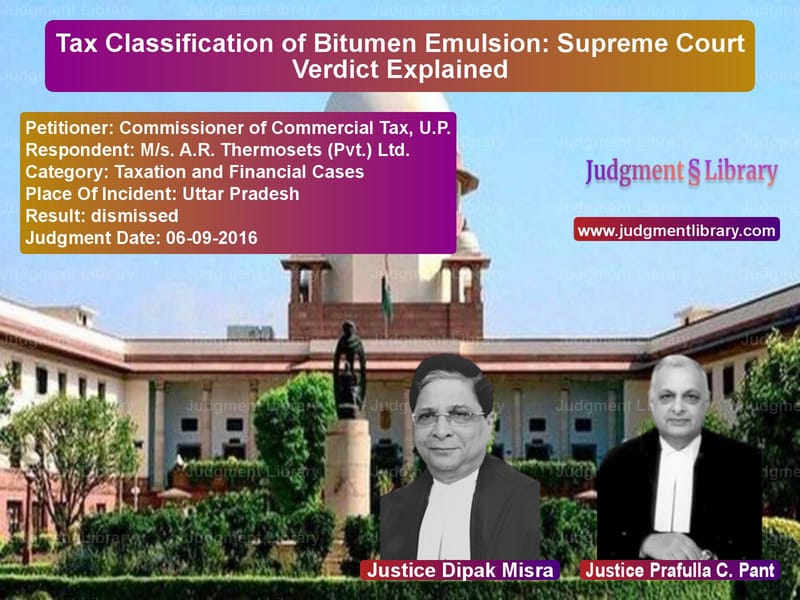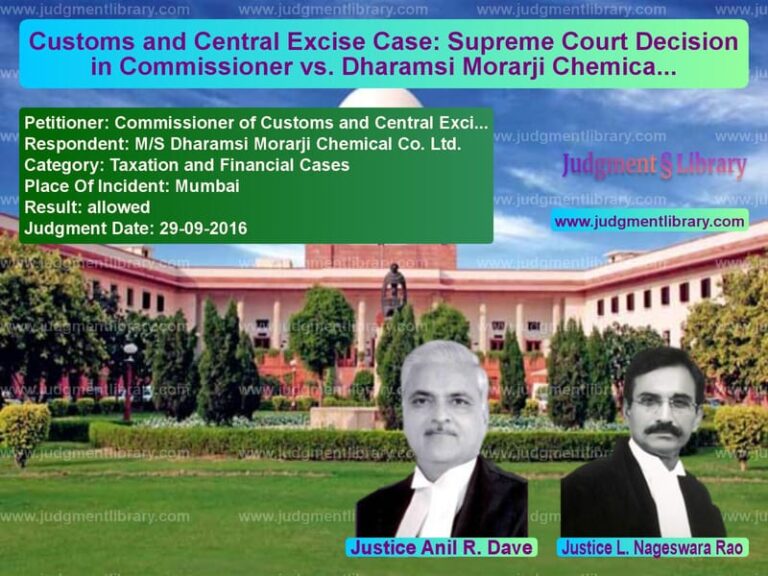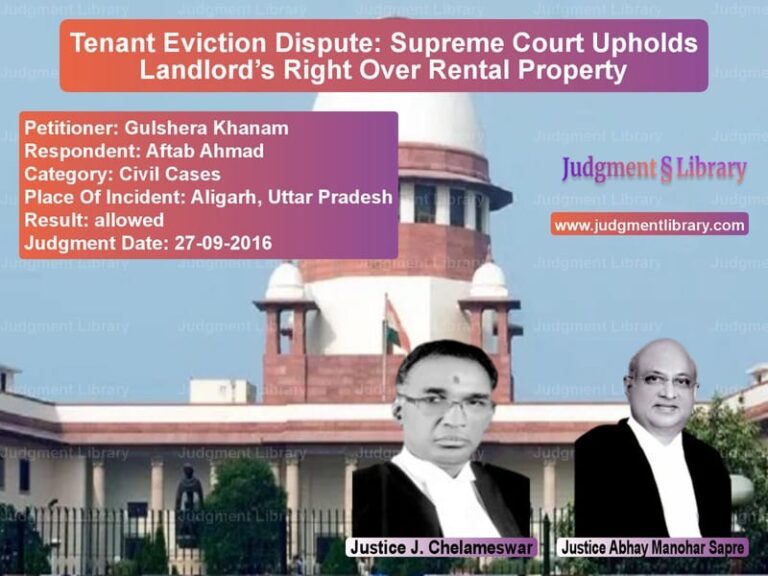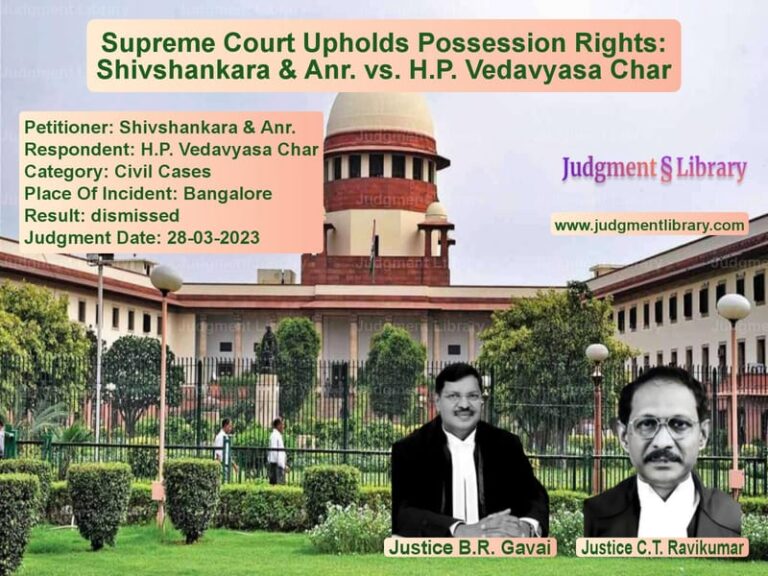Tax Classification of Bitumen Emulsion: Supreme Court Verdict Explained
The case of Commissioner of Commercial Tax, U.P. v. M/s. A.R. Thermosets (Pvt.) Ltd. revolves around the classification of bitumen emulsion for taxation under the U.P. Trade Tax Act, 1948, and the VAT Act, 2008. The Supreme Court addressed whether bitumen emulsion should be taxed as bitumen or as an unclassified commodity under the residuary category at a higher tax rate.
Background of the Case
M/s. A.R. Thermosets (Pvt.) Ltd., the respondent, is engaged in manufacturing bitumen emulsion. The company sought clarification from the Commissioner of Commercial Taxes, U.P., regarding the applicable tax rate for bitumen emulsion. The Commissioner ruled that bitumen emulsion was an unclassified commodity taxable at 12.5% under the residuary Entry.
Aggrieved by this decision, the respondent filed an appeal before the Tribunal, arguing that bitumen emulsion should be taxed at the same rate as bitumen, i.e., 4%, as per Serial No. 22, Part A, Schedule II of the VAT Act.
Tribunal and High Court Rulings
The Tribunal dismissed the appeal, upholding the Commissioner’s view. However, the respondent then approached the Allahabad High Court, which overturned the Tribunal’s decision. The High Court ruled that bitumen emulsion retains the essential characteristics of bitumen and, therefore, should be taxed at the lower rate applicable to bitumen.
Arguments Before the Supreme Court
Petitioner’s (Revenue) Arguments
- Bitumen and bitumen emulsion are distinct products, and the latter undergoes a manufacturing process that changes its composition.
- Under Section 2(t) of the VAT Act, any transformation of a product through processing amounts to manufacturing, justifying a higher tax rate.
- The classification of bitumen in the VAT Act does not include bitumen emulsion, and therefore, it should be taxed under the residuary category.
- The High Court erred in applying the end-use test to determine taxability.
Respondent’s (Assessee) Arguments
- Bitumen emulsion is merely a modified form of bitumen and retains its fundamental characteristics.
- Scientific reports from Harcourt Butler Technical Institute, Kanpur, establish that bitumen emulsion and bitumen share the same properties.
- Bitumen emulsion is widely recognized as a variant of bitumen in commercial and technical parlance.
- Resorting to the residuary Entry should be the last option when a specific classification exists.
Supreme Court’s Analysis and Judgment
The Supreme Court examined the definitions of bitumen and bitumen emulsion from various scientific sources, including Indian standards published by the Bureau of Indian Standards. The Court observed that bitumen emulsion consists of bitumen globules suspended in water with the help of emulsifiers, making it easier to use in road construction.
The Court applied three key tests:
- Identity Test: Bitumen emulsion retains the essential characteristics of bitumen.
- Common Parlance Test: In trade and commerce, bitumen and bitumen emulsion are used interchangeably.
- End-Use Test: Both products serve the same purpose in road construction.
The Court also noted that the VAT Act does not exclude bitumen emulsion from the scope of bitumen classification. Since the entry for bitumen does not specify limitations, it should be interpreted broadly to include all its variants, including bitumen emulsion.
Referring to previous judgments, the Supreme Court emphasized that a product should not be classified under the residuary Entry unless it is impossible to fit it within a specific category. Given that bitumen emulsion shares the same properties as bitumen, it was ruled that the lower tax rate should apply.
Consequently, the Supreme Court dismissed the appeal filed by the Revenue and upheld the High Court’s ruling.
Key Takeaways
- Bitumen emulsion qualifies for the same tax rate as bitumen under the VAT Act.
- Scientific evidence supports the classification of bitumen emulsion as a variant of bitumen.
- The common parlance and end-use tests play a crucial role in tax classification.
- Residuary tax entries should be applied only when no specific classification exists.
This ruling provides significant clarity on tax classification disputes and reinforces the principle that tax authorities must base their decisions on scientific and commercial realities.
Don’t miss out on the full details! Download the complete judgment in PDF format below and gain valuable insights instantly!
Download Judgment: Commissioner of Comm vs Ms. A.R. Thermosets Supreme Court of India Judgment Dated 06-09-2016-1741883695144.pdf
Direct Downlaod Judgment: Direct downlaod this Judgment
See all petitions in Income Tax Disputes
See all petitions in Tax Evasion Cases
See all petitions in Tax Refund Disputes
See all petitions in Judgment by Dipak Misra
See all petitions in Judgment by Prafulla C. Pant
See all petitions in dismissed
See all petitions in supreme court of India judgments September 2016
See all petitions in 2016 judgments
See all posts in Taxation and Financial Cases Category
See all allowed petitions in Taxation and Financial Cases Category
See all Dismissed petitions in Taxation and Financial Cases Category
See all partially allowed petitions in Taxation and Financial Cases Category







